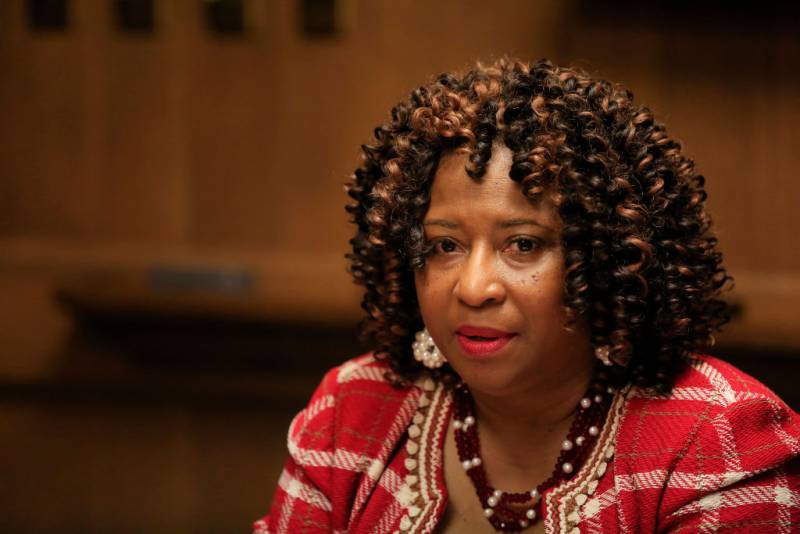Price has one advantage Boudin didn’t, Burris said: There are a lot more law enforcement agencies in Alameda County than in San Francisco.
“Alameda County is substantially different because we have multiple police agencies, large and small,” he said. And Alameda County law enforcement agencies “have different philosophies,” Burris said.
It’s a sentiment various sources echoed. Even if one law enforcement agency is dissatisfied with Price, they said, that doesn’t mean officers in another city would be. It’s not a unified front like San Francisco’s dissatisfied officers and detractors were with Boudin.
But opposition in just one of Alameda County’s major cities — for example, Oakland — could affect the work output of Price’s office, said Tom Orloff, who served as Alameda County District Attorney for more than two decades.
Orloff said “depolicing,” where police stop enforcing the law at higher rates, is a real threat if police feel they’re targeted unjustly.
“I mean, if everything that you do is going to be questioned, then maybe it’s easier just to ride around your car for eight hours and then go back to the station and go home,” Orloff said.
Barry Donelan, president of the Oakland Police Officers’ Association, thinks a work stoppage by his union members is unlikely, but for a reason people may not expect. Oakland cops didn’t much like Price’s predecessor, Nancy O’Malley, either, he said.
“This is not a new phenomenon for us,” Donelan said. And he’s willing to give Price a bit of time. “You give people grace and an opportunity to see where people are going,” he said.
But Orloff sees Price’s upcoming decision — on which law enforcement officers to charge, if any — as a bellwether.
In San Francisco, he said, you could see the difference between the city’s two former progressive district attorneys, George Gascón and Boudin, in which police cases they decided to pursue. Gascón’s decision to not charge, even during public outcry, was a mark of “realism,” Orloff said. Boudin famously lost one of his early landmark cases against a San Francisco police officer, who was accused of assault and battery charges and use of excessive force in a Fisherman’s Wharf domestic violence call in 2019.
“You need some experience to be able to tell whether these cases are actually winnable,” Orloff said.
Building stronger cases is partly why Price formed a new Public Accountability Unit to help review those older law enforcement cases, said Cristine Soto DeBerry, president of the Prosecutors Alliance of California, an organization working to reform the criminal justice system. DeBerry also served on Price’s transition team.
Price’s Public Accountability Unit is analogous to the Independent Investigations Bureau started in San Francisco under Gascón in 2015, after racist text messages between officers were discovered.
As Alameda County saw with numerous police cover-ups of misconduct during the Oakland Riders scandal, and as DeBerry saw firsthand when she worked under Gascón in San Francisco, police are often not equipped to investigate themselves.
“So many cases were not well-investigated before we set up our unit,” DeBerry said. “We had several instances in San Francisco where civilian witnesses weren’t identified. Where valuable experts to evaluate trajectories of gunshots or positions of vehicles and officers weren’t conducted with enough detail. Where interviews had leading questions that filled in the gaps for the witness.”
Investigations that are found lacking can seriously slow down a DA’s process. Notably, one of the cases Price reopened, the 2007 death of Andrew Wahnee Moppin-Buckskin at a traffic stop in East Oakland by rookie officers Hector Jimenez and Jessica Borello, took the Alameda County DA’s office six years to review.
Orloff, who was the district attorney at that time, said he couldn’t recall why that case took so long to resolve.
“That’s something that just got lost along the way. That should never happen. Maybe I’m partly to blame for that, I don’t know,” Orloff told KQED.
He may not know, but Price will want to find out. Fixing flaws in the investigation process may be a major benefit of reopening these older cases, even if few are charged, DeBerry said. That can help the DA’s office succeed in the future.
“Her team needs to know where the failings were,” DeBerry said.
Putting the realm of the political aside, there’s a more personal risk. Rev. Wanda Johnson learned that firsthand when former Alameda County District Attorney Nancy O’Malley reopened the investigation into the death of her son, Oscar Grant, in 2020. Grant was killed in 2009 by a BART police officer.
“It is a flood of emotions that cannot be described,” Johnson said. “It opens up that wound again. You’re in a waiting position. You’re in a hoping position. You’re in a praying position. You’re hoping that they get it right this time, and do what is right.”
O’Malley ultimately did not bring any new charges, a decision that was not only disappointing but also retraumatizing for Johnson.
Johnson counts herself as a major supporter of Price — she even spoke at Price’s inauguration — and she cautioned that the East Bay is far different from San Francisco. Unlike the repudiation of Boudin for pursuing cases against police, if Price doesn’t keep her campaign promise to pursue justice against law enforcement officers who wrongfully kill, Alameda County voters won’t let Price forget it.
“If she doesn’t do what’s right, the citizens will hold her accountable for her actions,” Johnson said.
And, Johnson said, she’d hold Price accountable, too.

